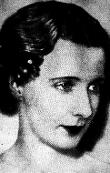Playwright, actress, director, producer, teacher.
OVERVIEW
The winner and finalist in several play competitions held during the 1930s, Phyllis Tweedie was a prominent member of the Perth Repertory Club (as dramatist, actress, and later director) during the 1930s and 1940s. At the same time she taught piano and singing, organised many social events, established herself as a highly popular entertainer, and was known to also present lectures of various aspects of literature (notably the 'whimsicalities' of great men and poets). Known professionally as Phyllis Montefiore following her marriage in 1938, she left Australia in the early 1950s for Britain and went on to carve out a career on the stage and in television up until 1968.
DETAILED BIOGRAPHY
1915-1929: Phyllis Tweedie was born in Western Australia, possibly in the state's Wiluna region where her father Thomas J. Tweedie co-owned Milbalillie Station with a gentleman named Ward. When the partners sold the million acre cattle property in 1926 Tweedie moved his family, which included Phyllis's older sister and brother, to the Nedlands area of Perth. Thomas Tweedie also reportedly owned a property at Waroona, 112 kilometres (70 miles) south of Perth, and was well-regarded for the cattle he showed various agricultural shows within the state.
In October 1926 Tweedie's 14 year-old daughter Phyllis wrote an article on country amateur theatricals which was published by the Daily Telegraph and North Murchison and Pilbarra Gazette. It's popularity with regional readers saw the piece republished on at least one occasion. Considered academically gifted, she attended the Perth Modern School, which had been established in 1911 in order to specially prepare students for entry to the University of Western Australia. Newspaper reports from the same period also indicate that Tweedie undertook a number of extra-curricular studies, including French lessons through the Alliance Francais Society and training in piano and singing.
1930-1939: While attending the University of Western Australia in 1934, Tweedie entered three plays in the Melbourne Dramatic Society's national one-act play competition. One of these works, The Queen's Marie, was awarded first prize and garnered the twenty-one year-old student much media attention around the country. This interest was also due to the fact that she was the youngest entrant in the competition. The Dramatist's Club published the script in its anthology Eight Plays by Australians (1934) and later in the year gave the play a rehearsed reading in Melbourne. Around the same time Perth's Little Theatre also awarded Tweedie first place in its play competition. Her winning entry was the one-act play, Many Mansions.
Tweedie's success as an emerging dramatist and her high standing within Perth's various literary organisations and social world saw her regularly included in the city's newspapers throughout the decade. A prominent member of the Repertory Club, Shakespeare Club, and Royal School's Music Club among other associations, she was also emerging as a much-sough after teacher of piano and singing. Her reputation in this area was further enhanced by being the only candidate from Western Australia in 1935 to obtain the Royal School of Music's Licentiate Diploma as Teacher of Singing ('St Brigid's' Sunday Times 26 January 1936, 21).
As a member of the Perth Repertory Club Tweedie was involved in numerous theatrical productions during the 1930s, including the staging of her own works. Her acting credits from this period include works by Shakespeare (notably As You Like It, The Merchant of Venice, and Twelfth Night), J. M. Barrie's The Admirable Crichton, John Galsworthy's The Show, and A.A. Milne's The Truth About Bayrd. She also often contributed to events and entertainments as a singer. Reviews from the mid-decade, for example, identify her performing Shakespearean songs for a special Shakespeare evening (Repertory Club, 1935), and the Shakespearean Club's 5th Anniversary event held the same year. Such was her reputation by 1935 that the Girl's Friendly Society secured her as a judge for its literary competition. Tweedie was the youngest person to have served in this position.
In 1937 Tweedie presented a paper to the members of the Royal School's Music Club (Karrakatta Hall, 10 April). The paper was titled 'Whimsicalities of Great Men.' The following year she gave another paper to members of the Fremantle Dramatic Club, this time titled "Whimsicalities of Poets' (2 April). Among her other notable achievements during the 1930s were directing the amateur entertainments staged during the 11th Battalion's Physical Training Display (2 September 1937), and directing several productions for the Repertory Club.
1940-1949:
Under construction
 7723761224484101140.png
7723761224484101140.png